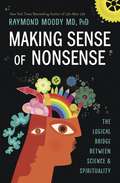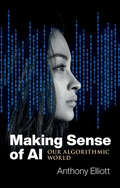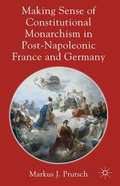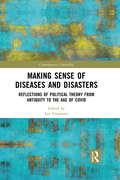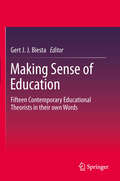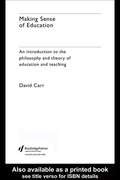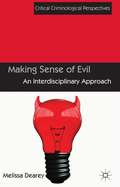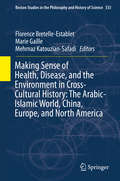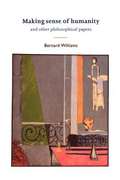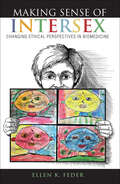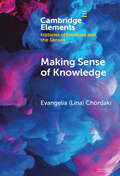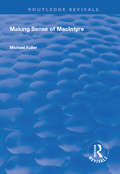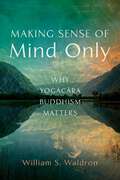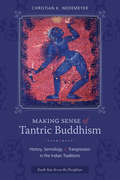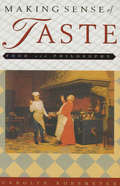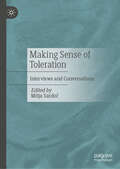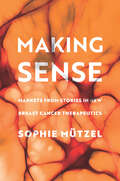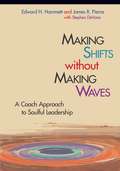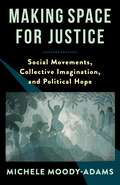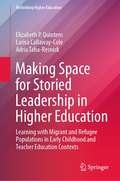- Table View
- List View
Making Sense Of Nonsense: The Logical Bridge Between Science And Spirituality
by Raymond MoodyWhat do the whimsical writings of Dr. Seuss have in common with near-death experiences? The answer is that nonsense writing and spiritual experiences seem to defy all logic and yet they both can make a powerful personal impact. In this book, New York Times bestselling author Dr. Raymond Moody shares the groundbreaking results of five decades of research into the philosophy of nonsense, revealing dynamic new perspectives on language, logic, and the mystical side of life. Explore the meaningful feelings that accompany nonsense language and learn how engaging with nonsense can help you on your own spiritual path. Discover how nonsense transcends classical logic, opening the doorway to new spiritual and philosophical breakthroughs. With dozens of examples from literature, comedy, music, and the history of religion, this book presents a unique new approach to the mysteries of the human spirit.
Making Sense in Common: A Reading of Whitehead in Times of Collapse (Posthumanities)
by Isabelle StengersA leading philosopher seeks to recover &“common sense&” as a meeting place to reconcile science and philosophy With her previous books on Alfred North Whitehead, Isabelle Stengers not only secured a reputation as one of the premier philosophers of our times but also inspired a rethinking of critical theory, political thought, and radical philosophy across a range of disciplines. Here, Stengers unveils what might well be seen as her definitive reading of Whitehead.Making Sense in Common will be greeted eagerly by the growing group of scholars who use Stengers&’s work on Whitehead as a model for how to think with conceptual precision through diverse domains of inquiry: environmentalism and ecology, animal studies, media and technology studies, the history and philosophy of science, feminism, and capitalism. On the other hand, the significance of this new book extends beyond Whitehead. Instead, it lies in Stengers&’s recovery of the idea of &“common sense&” as a meeting place—a commons—where opposed ideas of science and humanistic inquiry can engage one another and help to move society forward. Her reconciliation of science and philosophy is especially urgent today—when climate disaster looms all around us, when the values of what we thought of as civilization and modernity are discredited, and when expertise of any kind is under attack.
Making Sense of AI: Our Algorithmic World
by Anthony ElliottIndustrial robots, self-driving cars, customer-service chatbots and Google’s algorithmic predictions have brought the topic of artificial intelligence into public debate. Why is AI the source of such intense controversy and what are its economic, political, social and cultural consequences? Tracing the changing fortunes of artificial intelligence, Elliott develops a systematic account of how automated intelligent machines impact different spheres and aspects of public and private life. Among the issues discussed are the automation of workforces, surveillance capitalism, warfare and lethal autonomous weapons, the spread of racist robots and the automation of social inequalities. Elliott also considers the decisive role of AI in confronting global risks and social futures, including global pandemics such as COVID-19, and how smart algorithms are impacting the search for energy security and combating climate change. Making Sense of AI provides a judiciously comprehensive account of artificial intelligence for those with little or no previous knowledge of the topic. It will be an invaluable book both for students in the social sciences and humanities and for general readers.
Making Sense of Constitutional Monarchism in Post-Napoleonic France and Germany
by Markus J. PrutschThe collapse of the Napoleonic order in 1814 symbolised a victory over revolutionary principles, yet it was impossible to turn the clock back and negate the legacy of the Revolution and the Napoleonic age. Could monarchical claims for personal government be realistically reconciled with the legacy of the Revolution? This dilemma gave rise to the concept of a genuinely 'monarchical' form of political rule in Europe, which distinguished itself not only from absolutism and revolutionary constitutionalism, but also British parliamentarianism. Focusing on the genesis of 'constitutional monarchism' in the context of the French Restoration and its favourable reception in post-Napoleonic Germany, this study highlights the potential and limitations of the daring attempt to improve traditional forms of monarchical legitimacy by means of a modern representative constitution. With historical, legal and politico-theoretical aspects equally examined, this work contributes towards a clearer understanding both of the 19th century and European constitutionalism.
Making Sense of Diseases and Disasters: Reflections of Political Theory from Antiquity to the Age of COVID (Contemporary Liminality)
by Lee TrepanierThis book examines diseases and disasters from the perspective of social and political theory, exploring the ways in which political leaders, social activists, historians, philosophers, and writers have tried to make sense of the catastrophes that have plagued humankind from Thucydides to the present COVID pandemic. By adopting the perspective of political theory, it sheds light on what these individuals and events can teach us about politics, society, and human nature, as well as the insights and limitations of political theory. Including thinkers such as Thucydides, Sophocles, Augustine, Bacon, Locke, Hume, Rousseau, Publius, Bartolomé de las Casas, Jane Addams, Camus, Saramago, Baudrillard, Weber, Schmitt, Voegelin and Agamben, it considers a diverse range of events including the plagues of Byzantium and 14th century Europe, 9/11, the hurricanes of Fukushima, Boxing Day, and New Orleans, and the current COVID pandemic. An examination of past, present, and future diseases and disasters, and the ways in which individuals and societies react to them, this volume will appeal to scholars of politics, sociology, anthropology and philosophy with interests in disaster and the social body.
Making Sense of Education
by Gert BiestaThis volume gives educational theorists the chance to let rip and say what they really want to say. In doing so it sends a blast of fresh air through the dusty halls of academe. The vast majority of the literature in education theory and philosophy follows the conventions of academic writing, and rightly so. Yet its formal, abstract and objective style, which focuses on the careful presentation of theoretical and philosophical arguments, doesn't always give us insights into what motivates and drives the authors--while for academic neophytes it can be dense and arcane. Here, those same theorists and philosophers have been given the chance to expound at length on the topics that most exercise them. What concerns them, what gets them up in the morning, and what really matters most to them? Readers will discover what happens when these thinkers are explicitly invited to go beyond academic conventions and experiment with form, style and content. Featuring collected essays from leading educationalists from Norway, Sweden, Denmark, the USA, Canada, Israel Germany, Belgium and the UK, these essays provide vital insights into their work as well as being a compelling introduction to contemporary attempts to make sense of education through theory and philosophy. All these authors have made key contributions to the field, and their unique 'manifestos' make a fascinating read for any student or practitioner in education.
Making Sense of Education: An Introduction to the Philosophy and Theory of Education and Teaching
by David CarrMaking Sense of Education provides a contemporary introduction to the key issues in educational philosophy and theory. Exploring major past and present conceptions of education, teaching and learning, this book makes philosophy of education relevant to the professional practice of teachers and student teachers, as well of interest to those studying education as an academic subject.The book is divided into three parts: education, teaching and professional practice: issues concerning education, the role of the teacher, the relationship of educational theory to practice and the wider moral dimensions of pedagogy learning, knowledge and curriculum: issues concerning behaviourist and cognitive theories of learning, knowledge and meaning, curriculum aims and content and evaluation and assessment schooling, society and culture: issues of the wider social and political context of education concerning liberalism and communitarianism, justice and equality, differentiation, authority and discipline. This timely and up-to-date introduction assists all those studying and/or working in education to appreciate the main philosophical sources of and influences on present day thinking about education, teaching and learning
Making Sense of Evil
by Melissa DeareyWhen it comes to crime, everyone seems to take evil seriously as an explanatory concept - except criminologists. This book asks why, and why not, through exploring a variety of interdisciplinary approaches to evil from the perspectives of theology, philosophy, literary and cultural studies, and the social sciences.
Making Sense of Health, Disease, and the Environment in Cross-Cultural History: The Arabic-Islamic World, China, Europe, and North America (Boston Studies in the Philosophy and History of Science #333)
by Florence Bretelle-Establet Mehrnaz Katouzian-Safadi Marie GailleThis book has been defined around three important issues: the first sheds light on how people, in various philosophical, religious, and political contexts, understand the natural environment, and how the relationship between the environment and the body is perceived; the second focuses on the perceptions that a particular natural environment is good or bad for human health and examines the reasons behind such characterizations ; the third examines the promotion, in history, of specific practices to take advantage of the health benefits, or avoid the harm, caused by certain environments and also efforts made to change environments supposed to be harmful to human health. The feeling and/or the observation that the natural environment can have effects on human health have been, and are still commonly shared throughout the world. This led us to raise the issue of the links observed and believed to exist between human beings and the natural environment in a broad chronological and geographical framework. In this investigation, we bring the reader from ancient and late imperial China to the medieval Arab world up to medieval, modern, and contemporary Europe. This book does not examine these relationships through the prism of the knowledge of our modern contemporary European experience, which, still too often, leads to the feeling of totally different worlds. Rather, it questions protagonists who, in different times and in different places, have reflected, on their own terms, on the links between environment and health and tries to obtain a better understanding of why these links took the form they did in these precise contexts. This book targets an academic readership as well as an “informed audience”, for whom present issues of environment and health can be nourished by the reflections of the past.
Making Sense of Human Rights (Second Edition)
by James W. NickelThis fully revised and extended edition of James Nickel’s classic study explains and defends the contemporary conception of human rights. Combining philosophical, legal and political approaches, Nickel explains international human rights law and addresses questions of justification and feasibility.
Making Sense of Humanity and Other Philosophical Papers 1982-1993
by Bernard WilliamsLike the two earlier volumes of Bernard Williams' papers published by Cambridge University Press, Problems of the Self and Moral Luck, Making Sense of Humanity will be welcomed by all readers with a serious interest in philosophy. It is published alongside a volume of essays on Williams' work, World, Mind and Ethics: Essays on the Ethical Philosophy of Bernard Williams, edited by J. E. J. Altham and Ross Harrison, which provides a reappraisal of his work by other distinguished thinkers in the field.
Making Sense of Intersex: Changing Ethical Perspectives in Biomedicine
by Ellen K. FederA philosopher offers a framework for the treatment of intersex children, and a moral argument for responsibility to them and their families.Putting the ethical tools of philosophy to work, Ellen K. Feder seeks to clarify how we should understand “the problem” of intersex. Adults often report that medical interventions they underwent as children to “correct” atypical sex anatomies caused them physical and psychological harm. Proposing a philosophical framework for the treatment of children with intersex conditions—one that acknowledges the intertwined identities of parents, children, and their doctors—Feder presents a persuasive moral argument for collective responsibility to these children and their families.“In a voice both urgent and nuanced, Feder squarely faces the complexities that accompany the care of people with atypical sex anatomies in medical science. . . . Rich with cross-discipline potential, Feder’s engaging argument should provide a new approach for doctors and parents caring for children with atypical sex anatomy.” —Publishers Weekly, starred review“Feder’s book is a welcome injection of new ideas into feminist scholarship on intersex, post-Consensus Statement era.” —Women’s Review of Books“Is a work of philosophy capable of bringing insightful new perspectives or illuminating and forceful arguments to an urgent social matter so as truly to effect a felt change in the lives of people concerned by it? Feder’s book is capable of this effect. As such, it takes the risk of calling forth a new public, or a new readership, and so is a work whose appeal could well be ahead of its time. But its time should be here.” —International Journal of Feminist Approaches to Bioethics“Making Sense of Intersex significantly enhances our understanding of intersex and the ethical issues involved in medical practice more generally.” —Kennedy Institute of Ethics Journal
Making Sense of Knowledge: Feminist Epistemologies in the Greek Birth Control Movement (1974–1986) (Elements in Histories of Emotions and the Senses)
by Evangelia (Lina) ChordakiWhat counts as knowledge, expertise, and theory? How are knowledge hierarchies connected to emotional and hierarchies of subjects? How does the division between emotion and reason shape our experiences? The Element addresses these questions by exploring the Greek feminist birth control movement (1974–1986), focusing on the production and circulation of knowledge, termed as affective epistemologies of antimilima (talking back). This concept reinterprets women's lived and embodied knowledge, emerging at the intersection of academia and social movements, as a form of resistance against established expertise. By drawing on feminist theorists like Donna Haraway and Sara Ahmed, the Element critically examines the relationship between scientific and experiential knowledge. This analysis reconfigures the interplay between rationality and emotion, providing a critique to the binary model of thought and suggesting new avenues for democratic knowledge, society, and citizenship. Historical tracing of these theories offers a counter-narrative to contemporary anti-gender, anti-intellectual, and far-right politics.
Making Sense of MacIntyre (Routledge Revivals)
by Michael FullerFirst published in 1998, this influential volume undertakes a task of exposition and interpretation in explaining the views of this important yet elusive ethical philosopher and why he thought modern moral and political philosophy so muddled. Fuller places MacIntyre in his philosophical context, draws out his attitudes towards ethical issues and attempts to uncover and explain his influences. In four parts, Fuller explores the board outline of MacIntyre’s position, casuistry and the nature of tethics, MacIntyre’s arguments on truth and reason and lastly his notions of narrative unity, ethical justification, tradition along with views on fact, theory and value.
Making Sense of Mass Education
by Gordon TaitMaking Sense of Mass Education provides a comprehensive analysis of the field of mass education. The book presents new assessment of traditional issues associated with education - class, race, gender, discrimination and equity - to dispel myths and assumptions about the classroom. It examines the complex relationship between the media, popular culture and schooling, and places the expectations surrounding the modern teacher within ethical, legal and historical contexts. The book blurs some of the disciplinary boundaries within the field of education, drawing upon sociology, cultural studies, history, philosophy, ethics and jurisprudence to provide stronger analyses. It is also accompanied by an extensive companion website which features teaching notes, discussion questions, vignettes and exercises. The book reframes the sociology of education as a complex mosaic of cultural practices, forces and innovations. Engaging and contemporary, it is an invaluable resource for teacher education students, and anyone interested in a better understanding of mass education.
Making Sense of Mind Only: Why Yogacara Buddhism Matters
by William S. WaldronThrough engaging, contemporary examples, Making Sense of Mind Only reveals the Yogacara school of Indian Buddhism as a coherent system of ideas and practices for the path to liberation, contextualizing its key texts and rendering them accessible and relevant.The Yogacara, or Yoga Practice, school is one of the two schools of Mahayana Buddhism that developed in the early centuries of the common era. Though it arose in India, Mahayana Buddhism now flourishes in China, Tibet, Korea, Vietnam, and Japan. While the other major Mahayana tradition, the Madhyamaka (Middle Way), focuses on the concept of emptiness—that all phenomena lack an intrinsic essence—the Yogacara school focuses on the cognitive processes whereby we impute such essences. Through everyday examples and analogues in cognitive science, author William Waldron makes Yogacara&’s core teachings—on the three turnings of the Dharma wheel, the three natures, the storehouse consciousness, and mere perception—accessible to a broad audience. In contrast to the common characterization of Yogacara as philosophical idealism, Waldron presents Yogacara Buddhism on its own terms, as a coherent system of ideas and practices, with dependent arising its guiding principle. The first half of Making Sense of Mind Only explores the historical context for Yogacara&’s development. Waldron examines early Buddhist texts that show how our affective and cognitive processes shape the way objects and worlds appear to us, and how we erroneously grasp onto them as essentially real—perpetuating the habits that bind us to samsara. He then analyzes the early Madhyamaka critique of essences. This context sets the stage for the book&’s second half, an examination of how Yogacara texts such as the Samdhinirmocana Sutra and Asanga&’s Stages of Yogic Practice (Yogacarabhumi) build upon these earlier ideas by arguing that our constructive processes also occur unconsciously. Not only do we collectively, yet mostly unknowingly, construct shared realities or cultures, our shared worlds are also mediated through the storehouse consciousness (alayavijñana) functioning as a cultural unconscious. Vasubandhu&’s Twenty Verses argues that we can learn to recognize such objects and worlds as &“mere perceptions&” (vijñaptimatra) and thereby abandon our enchantment with the products of our own cognitive processes. Finally, Maitreya&’s Distinguishing Phenomena from Their Ultimate Nature (Dharmadharmatavibhaga) elegantly lays out the Mahayana path to this transformation.
Making Sense of Science: Separating Substance from Spain
by Cornelia DeanCornelia Dean draws on her 30 years as a science journalist with the New York Times to expose the flawed reasoning and knowledge gaps that handicap readers when they try to make sense of science. She calls attention to conflicts of interest in research and the price society pays when science journalism declines and funding dries up.
Making Sense of Tantric Buddhism: History, Semiology, and Transgression in the Indian Traditions (South Asia Across the Disciplines)
by Christian WedemeyerMaking Sense of Tantric Buddhism fundamentally rethinks the nature of the transgressive theories and practices of the Buddhist Tantric traditions, challenging the notion that the Tantras were "marginal" or primitive and situating them instead—both ideologically and institutionally—within larger trends in mainstream Buddhist and Indian culture.Critically surveying prior scholarship, Wedemeyer exposes the fallacies of attributing Tantric transgression to either the passions of lusty monks, primitive tribal rites, or slavish imitation of Saiva traditions. Through comparative analysis of modern historical narratives—that depict Tantrism as a degenerate form of Buddhism, a primal religious undercurrent, or medieval ritualism—he likewise demonstrates these to be stock patterns in the European historical imagination.Through close analysis of primary sources, Wedemeyer reveals the lived world of Tantric Buddhism as largely continuous with the Indian religious mainstream and deploys contemporary methods of semiotic and structural analysis to make sense of its seemingly repellent and immoral injunctions. Innovative, semiological readings of the influential Guhyasamaja Tantra underscore the text's overriding concern with purity, pollution, and transcendent insight—issues shared by all Indic religions—and a large-scale, quantitative study of Tantric literature shows its radical antinomianism to be a highly managed ritual observance restricted to a sacerdotal elite. These insights into Tantric scripture and ritual clarify the continuities between South Asian Tantrism and broader currents in Indian religion, illustrating how thoroughly these "radical" communities were integrated into the intellectual, institutional, and social structures of South Asian Buddhism.
Making Sense of Taste: Food and Philosophy
by Carolyn KorsmeyerTaste, perhaps the most intimate of the five senses, has traditionally been considered beneath the concern of philosophy, too bound to the body, too personal and idiosyncratic. Yet, in addition to providing physical pleasure, eating and drinking bear symbolic and aesthetic value in human experience, and they continually inspire writers and artists.In Making Sense of Taste, Carolyn Korsmeyer explains how taste came to occupy so low a place in the hierarchy of senses and why it is deserving of greater philosophical respect and attention. Korsmeyer begins with the Greek thinkers who classified taste as an inferior, bodily sense; she then traces the parallels between notions of aesthetic and gustatory taste that were explored in the formation of modern aesthetic theories. She presents scientific views of how taste actually works and identifies multiple components of taste experiences.Turning to taste's objects—food and drink—she looks at the different meanings they convey in art and literature as well as in ordinary human life and proposes an approach to the aesthetic value of taste that recognizes the representational and expressive roles of food. Korsmeyer's consideration of art encompasses works that employ food in contexts sacred and profane, that seek to whet the appetite and to keep it at bay; her selection of literary vignettes ranges from narratives of macabre devouring to stories of communities forged by shared eating.
Making Sense of Toleration: Interviews and Conversations
by Mitja SardočThis book brings together a collection of interviews and conversations with leading scholars across different disciplines and areas of research including moral and political philosophy, history, sociology, political theory, psychology, and jurisprudence, among others. It provides an authoritative presentation of contemporary accounts of toleration, their conceptual foundations, and a comprehensive presentation of the different concepts most commonly associated with it (e.g. civility, dignity, coercion, harm, conflict, disagreement, secularism, power, domination, trust, non-interference, neutrality, fairness, pluralism, respect, recognition and ultimately diversity itself). The interviews and conversations published in this volume address some of the most pressing controversies on toleration (and related issues) at both the theoretical and practical levels. Alongside customary refinements of arguments and positions usually embedded in academic conversations, these interviews provide unique insights into the ‘behind the scenes’ on one of the central topics in contemporary scholarly research.
Making Sense: Markets from Stories in New Breast Cancer Therapeutics (Culture and Economic Life)
by Sophie MützelBreast cancer is one of the most commonly diagnosed cancers and a leading cause of death for women worldwide. With advances in molecular engineering in the 1980s, hopes began to rise that a non-toxic and non-invasive treatment for breast cancer could be developed. These hopes were stoked by the researchers, biotech companies, and analysts who worked to make sense of the uncertainties during product development. In Making Sense Sophie Mützel traces this emergence of "innovative breast cancer therapeutics" from the late 1980s up to 2010, through the lens of the narratives of the involved actors. Combining theories of economic and cultural sociology, Mützel shows how stories are integral for the emergence of new markets; stories of the future create a market of expectations prior to any existing products; stories also help to create categories on what such a new market and its products are about. Making Sense uses thousands of press statements, media reports, scientific reports, and financial and industry analyses, and combines qualitative and large-scale computational text analyses, to illustrate these mechanisms, presenting a fresh view of how life-prolonging innovations can be turned into market products.
Making Shifts without Making Waves
by Edward H. Hammett James R. Pierce Stephen DevaneIn an age of storms created by fast-paced lives, an unpredictable economy, population diversity, family life, and church/denomination challenges, leaders and organizations are needing new skills and strategies to deal with these changes. Making Shifts without Making Waves addresses the fears and aimlessness many organizations and leaders face when dealing with transition and change.
Making Social Science Matter
by Bent FlyvbjergMaking Social Science Matter presents an exciting new approach to the social and behavioral sciences including theoretical argument, methodological guidelines, and examples of practical application. Why has social science failed in attempts to emulate natural science and produce normal theory? Bent Flyvbjerg argues that the strength of social sciences lies in its rich, reflexive analysis of values and power, essential to the social and economic development of any society. Richly informed, powerfully argued, and clearly written, this book opens up a new future for the social sciences. Its empowering message will make it required reading for students and academics across the social and behavioral sciences.
Making Space for Justice: Social Movements, Collective Imagination, and Political Hope
by Michele Moody-AdamsFrom nineteenth-century abolitionism to Black Lives Matter today, progressive social movements have been at the forefront of social change. Yet it is seldom recognized that such movements have not only engaged in political action but also posed crucial philosophical questions about the meaning of justice and about how the demands of justice can be met.Michele Moody-Adams argues that anyone who is concerned with the theory or the practice of justice—or both—must ask what can be learned from social movements. Drawing on a range of compelling examples, she explores what they have shown about the nature of justice as well as what it takes to create space for justice in the world. Moody-Adams considers progressive social movements as wellsprings of moral inquiry and as agents of social change, drawing out key philosophical and practical principles. Social justice demands humane regard for others, combining compassionate concern and robust respect. Successful movements have drawn on the transformative power of imagination, strengthening the motivation to pursue justice and to create the political institutions and social policies that can sustain it by inspiring political hope.Making Space for Justice contends that the insights arising from social movements are critical to bridging the gap between discerning theory and effective practice—and should be transformative for political thought as well as for political activism.
Making Space for Storied Leadership in Higher Education: Learning with Migrant and Refugee Populations in Early Childhood and Teacher Education Contexts (Rethinking Higher Education)
by Elizabeth P. Quintero Larisa Callaway-Cole Adria Taha-ResnickThis book analyzes stories of university early childhood faculty members, community activists in southern California, and children and the early childhood teacher education students working with them. The grounding of this research is reconceptualization of postmodern narrative theoretical influences. Through narrative inquiry, the book connects ongoing research to ongoing pedagogy. It explores the following research questions: (1) How do learners across generations create, build upon, and reinvent each other’s stories to make new meanings through consideration of family history, multigenerational knowledge, and experiences?; (2) How do learners’ stories offer new possibilities through leadership that connects Global South knowledge with Global North contexts?; (3) In what ways is it possible to use this framework and methodology in Higher Education to promote systemic consistency in promoting social justice that is generatively inclusive?More than half of the research participants have truly lived bi-culturally, many of the children in the early care and education programs in the USA are from Mexico and Central America. These collaborators truly carry their roots with them as they strive for justice and authenticity in early childhood teacher education and community activists working with families and children.
